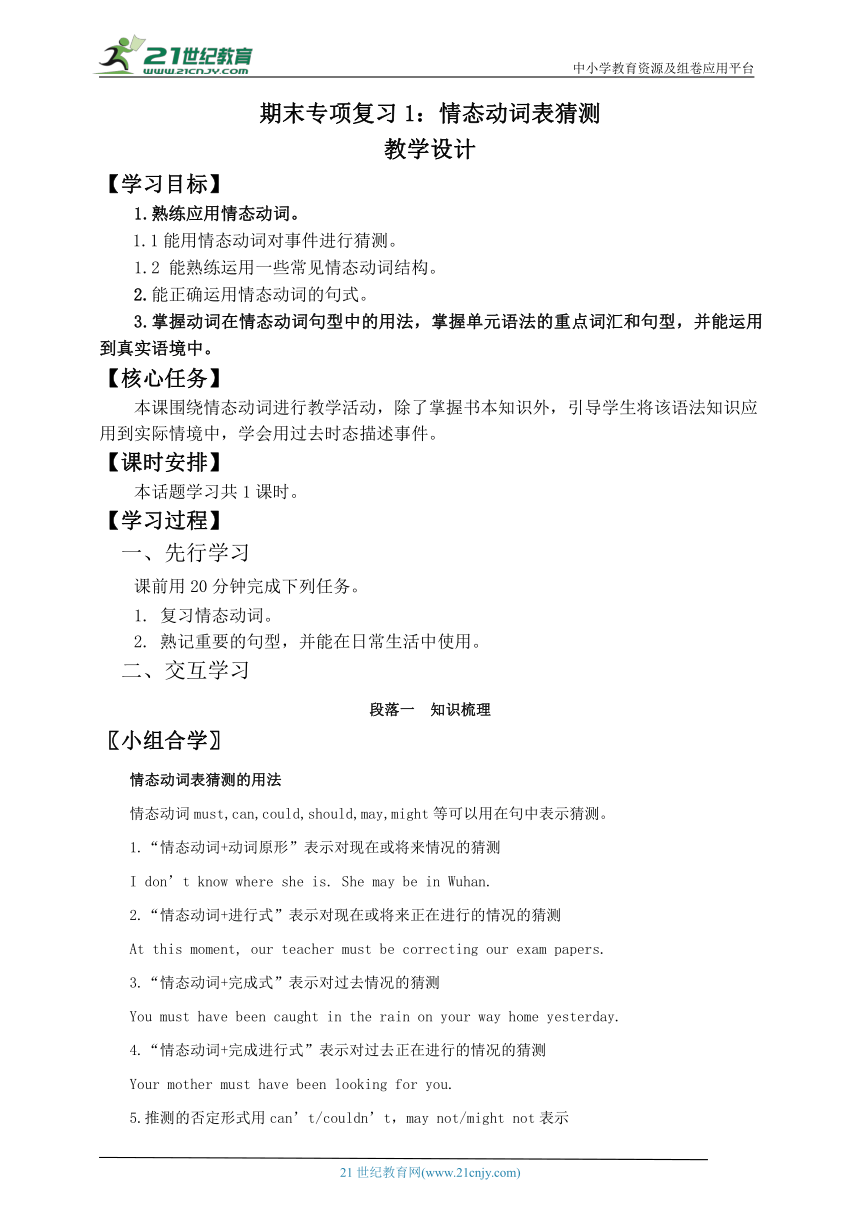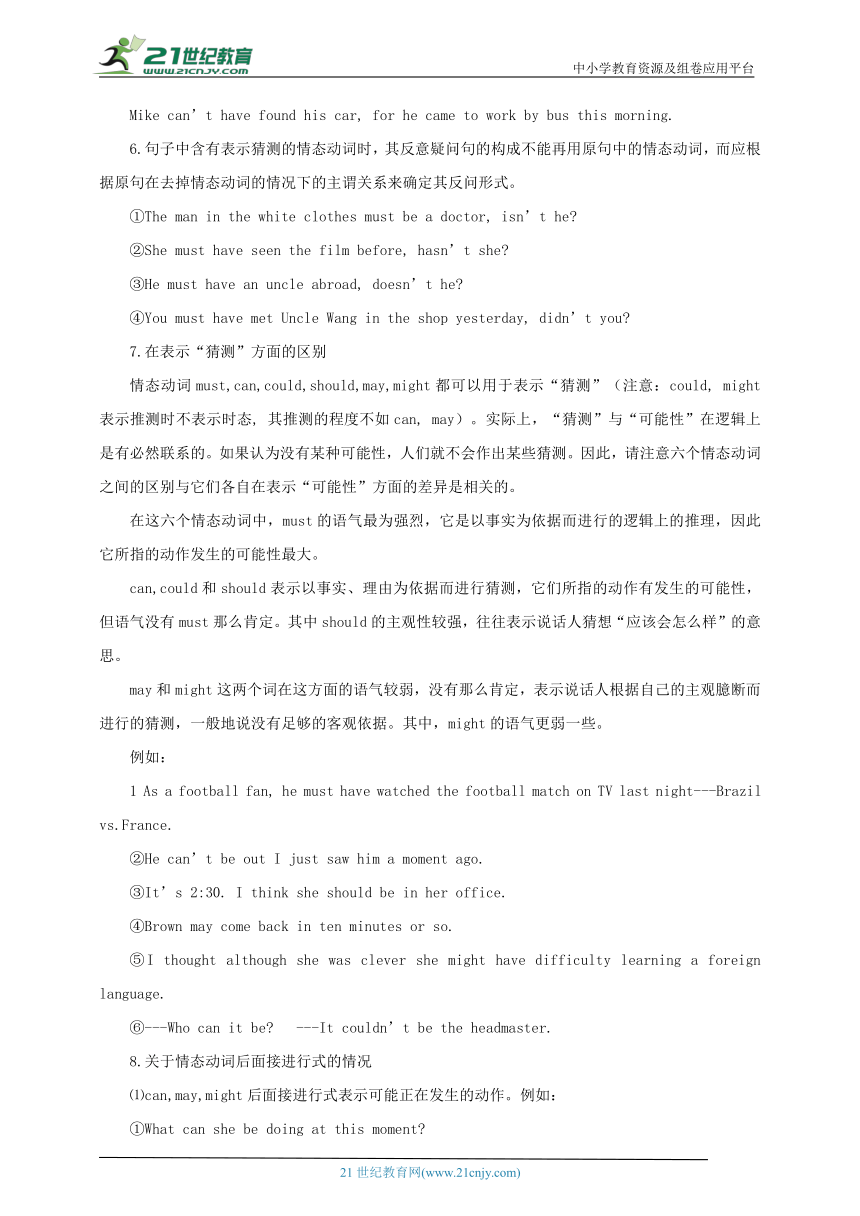期末专项复习1:情态动词表猜测 教学设计 人教新目标(Go for it)版 九年级全册
文档属性
| 名称 | 期末专项复习1:情态动词表猜测 教学设计 人教新目标(Go for it)版 九年级全册 |

|
|
| 格式 | doc | ||
| 文件大小 | 387.2KB | ||
| 资源类型 | 试卷 | ||
| 版本资源 | 人教新目标(Go for it)版 | ||
| 科目 | 英语 | ||
| 更新时间 | 2025-08-23 18:32:39 | ||
图片预览


文档简介
中小学教育资源及组卷应用平台
期末专项复习1:情态动词表猜测
教学设计
【学习目标】
1.熟练应用情态动词。
1.1能用情态动词对事件进行猜测。
1.2 能熟练运用一些常见情态动词结构。
2.能正确运用情态动词的句式。
3.掌握动词在情态动词句型中的用法,掌握单元语法的重点词汇和句型,并能运用到真实语境中。
【核心任务】
本课围绕情态动词进行教学活动,除了掌握书本知识外,引导学生将该语法知识应用到实际情境中,学会用过去时态描述事件。
【课时安排】
本话题学习共1课时。
【学习过程】
一、先行学习
课前用20分钟完成下列任务。
1. 复习情态动词。
2. 熟记重要的句型,并能在日常生活中使用。
二、交互学习
段落一 知识梳理
〖小组合学〗
情态动词表猜测的用法
情态动词must,can,could,should,may,might等可以用在句中表示猜测。
1.“情态动词+动词原形”表示对现在或将来情况的猜测
I don’t know where she is. She may be in Wuhan.
2.“情态动词+进行式”表示对现在或将来正在进行的情况的猜测
At this moment, our teacher must be correcting our exam papers.
3.“情态动词+完成式”表示对过去情况的猜测
You must have been caught in the rain on your way home yesterday.
4.“情态动词+完成进行式”表示对过去正在进行的情况的猜测
Your mother must have been looking for you.
5.推测的否定形式用can’t/couldn’t,may not/might not表示
Mike can’t have found his car, for he came to work by bus this morning.
6.句子中含有表示猜测的情态动词时,其反意疑问句的构成不能再用原句中的情态动词,而应根据原句在去掉情态动词的情况下的主谓关系来确定其反问形式。
①The man in the white clothes must be a doctor, isn’t he
②She must have seen the film before, hasn’t she
③He must have an uncle abroad, doesn’t he
④You must have met Uncle Wang in the shop yesterday, didn’t you
7.在表示“猜测”方面的区别
情态动词must,can,could,should,may,might都可以用于表示“猜测”(注意:could, might表示推测时不表示时态, 其推测的程度不如can, may)。实际上,“猜测”与“可能性”在逻辑上是有必然联系的。如果认为没有某种可能性,人们就不会作出某些猜测。因此,请注意六个情态动词之间的区别与它们各自在表示“可能性”方面的差异是相关的。
在这六个情态动词中,must的语气最为强烈,它是以事实为依据而进行的逻辑上的推理,因此它所指的动作发生的可能性最大。
can,could和should表示以事实、理由为依据而进行猜测,它们所指的动作有发生的可能性,但语气没有must那么肯定。其中should的主观性较强,往往表示说话人猜想“应该会怎么样”的意思。
may和might这两个词在这方面的语气较弱,没有那么肯定,表示说话人根据自己的主观臆断而进行的猜测,一般地说没有足够的客观依据。其中,might的语气更弱一些。
例如:
1 As a football fan, he must have watched the football match on TV last night---Brazil vs.France.
②He can’t be out I just saw him a moment ago.
③It’s 2:30. I think she should be in her office.
④Brown may come back in ten minutes or so.
⑤I thought although she was clever she might have difficulty learning a foreign language.
⑥---Who can it be ---It couldn’t be the headmaster.
8.关于情态动词后面接进行式的情况
⑴can,may,might后面接进行式表示可能正在发生的动作。例如:
①What can she be doing at this moment
②Your mother may be waiting for you to return home.
③They might be planning to make a loan for their new project.
⑵must后面接进行式表示想必正在做某事。如:You must be thinking where I learned it.
⑶should后面接进行式表示应该正在做某事。如:You should be doing your exercises
instead of watching TV.
9.关于情态动词后面接完成式的情况
⑴can后面接完成式表示可能已经做了某事。如:Where can they have gone
⑵could后面接完成式表示本可能发生或本可以做的事而没有发生或没有做,它的否定形式则表示本不可能发生或本不可以做的事而已经发生或已经做了。如:
①The output could have been increased by 15%.
②Judging from her appearance and manner, she couldn’t have been over fifty years old.
⑶may后面接完成式表示可能已经发生的动作。如: They may have seen that movie.
⑷might后面接完成式表示本可能发生或本可以做的事而没有发生或没有做。例如:
She might have done better than that.
⑸must后面接完成式表示想必已经发生的事。例如:It must have snowed last night for it’s so cold this morning.
〖练习运用〗
一、填空。
1. Look! The light is out in her room. She _________ to bed already.
A. must go B. had to go C.must have gone D.has gone
2. We had a wonderful time yesterday. You _________ .Why didn't you come
A. had to come B.should have come C.might have come D.must have come
3. ─There were already five people in the car but they managed to take me as well. ─ It _________ a comfortable journey.
A. can't be B. shouldn't be C. mustn't have been D. couldn't have been
4. My sister met him at the Grand Theatre yesterday afternoon, so he _________ your lecture.
A. couldn't have attended B. needn't have attended
C. mustn't have attended D. shouldn't have attended
5. I was really anxious about you. You _________ home without a word.
A. mustn't leave B. Shouldn't have left
C. Couldn't have left D. needn't leave
三、后续学习
深入理解情态动词表猜测,并尝试根据例句来分析其用法。
21世纪教育网 www.21cnjy.com 精品试卷·第 2 页 (共 2 页)
HYPERLINK "http://21世纪教育网(www.21cnjy.com)
" 21世纪教育网(www.21cnjy.com)
期末专项复习1:情态动词表猜测
教学设计
【学习目标】
1.熟练应用情态动词。
1.1能用情态动词对事件进行猜测。
1.2 能熟练运用一些常见情态动词结构。
2.能正确运用情态动词的句式。
3.掌握动词在情态动词句型中的用法,掌握单元语法的重点词汇和句型,并能运用到真实语境中。
【核心任务】
本课围绕情态动词进行教学活动,除了掌握书本知识外,引导学生将该语法知识应用到实际情境中,学会用过去时态描述事件。
【课时安排】
本话题学习共1课时。
【学习过程】
一、先行学习
课前用20分钟完成下列任务。
1. 复习情态动词。
2. 熟记重要的句型,并能在日常生活中使用。
二、交互学习
段落一 知识梳理
〖小组合学〗
情态动词表猜测的用法
情态动词must,can,could,should,may,might等可以用在句中表示猜测。
1.“情态动词+动词原形”表示对现在或将来情况的猜测
I don’t know where she is. She may be in Wuhan.
2.“情态动词+进行式”表示对现在或将来正在进行的情况的猜测
At this moment, our teacher must be correcting our exam papers.
3.“情态动词+完成式”表示对过去情况的猜测
You must have been caught in the rain on your way home yesterday.
4.“情态动词+完成进行式”表示对过去正在进行的情况的猜测
Your mother must have been looking for you.
5.推测的否定形式用can’t/couldn’t,may not/might not表示
Mike can’t have found his car, for he came to work by bus this morning.
6.句子中含有表示猜测的情态动词时,其反意疑问句的构成不能再用原句中的情态动词,而应根据原句在去掉情态动词的情况下的主谓关系来确定其反问形式。
①The man in the white clothes must be a doctor, isn’t he
②She must have seen the film before, hasn’t she
③He must have an uncle abroad, doesn’t he
④You must have met Uncle Wang in the shop yesterday, didn’t you
7.在表示“猜测”方面的区别
情态动词must,can,could,should,may,might都可以用于表示“猜测”(注意:could, might表示推测时不表示时态, 其推测的程度不如can, may)。实际上,“猜测”与“可能性”在逻辑上是有必然联系的。如果认为没有某种可能性,人们就不会作出某些猜测。因此,请注意六个情态动词之间的区别与它们各自在表示“可能性”方面的差异是相关的。
在这六个情态动词中,must的语气最为强烈,它是以事实为依据而进行的逻辑上的推理,因此它所指的动作发生的可能性最大。
can,could和should表示以事实、理由为依据而进行猜测,它们所指的动作有发生的可能性,但语气没有must那么肯定。其中should的主观性较强,往往表示说话人猜想“应该会怎么样”的意思。
may和might这两个词在这方面的语气较弱,没有那么肯定,表示说话人根据自己的主观臆断而进行的猜测,一般地说没有足够的客观依据。其中,might的语气更弱一些。
例如:
1 As a football fan, he must have watched the football match on TV last night---Brazil vs.France.
②He can’t be out I just saw him a moment ago.
③It’s 2:30. I think she should be in her office.
④Brown may come back in ten minutes or so.
⑤I thought although she was clever she might have difficulty learning a foreign language.
⑥---Who can it be ---It couldn’t be the headmaster.
8.关于情态动词后面接进行式的情况
⑴can,may,might后面接进行式表示可能正在发生的动作。例如:
①What can she be doing at this moment
②Your mother may be waiting for you to return home.
③They might be planning to make a loan for their new project.
⑵must后面接进行式表示想必正在做某事。如:You must be thinking where I learned it.
⑶should后面接进行式表示应该正在做某事。如:You should be doing your exercises
instead of watching TV.
9.关于情态动词后面接完成式的情况
⑴can后面接完成式表示可能已经做了某事。如:Where can they have gone
⑵could后面接完成式表示本可能发生或本可以做的事而没有发生或没有做,它的否定形式则表示本不可能发生或本不可以做的事而已经发生或已经做了。如:
①The output could have been increased by 15%.
②Judging from her appearance and manner, she couldn’t have been over fifty years old.
⑶may后面接完成式表示可能已经发生的动作。如: They may have seen that movie.
⑷might后面接完成式表示本可能发生或本可以做的事而没有发生或没有做。例如:
She might have done better than that.
⑸must后面接完成式表示想必已经发生的事。例如:It must have snowed last night for it’s so cold this morning.
〖练习运用〗
一、填空。
1. Look! The light is out in her room. She _________ to bed already.
A. must go B. had to go C.must have gone D.has gone
2. We had a wonderful time yesterday. You _________ .Why didn't you come
A. had to come B.should have come C.might have come D.must have come
3. ─There were already five people in the car but they managed to take me as well. ─ It _________ a comfortable journey.
A. can't be B. shouldn't be C. mustn't have been D. couldn't have been
4. My sister met him at the Grand Theatre yesterday afternoon, so he _________ your lecture.
A. couldn't have attended B. needn't have attended
C. mustn't have attended D. shouldn't have attended
5. I was really anxious about you. You _________ home without a word.
A. mustn't leave B. Shouldn't have left
C. Couldn't have left D. needn't leave
三、后续学习
深入理解情态动词表猜测,并尝试根据例句来分析其用法。
21世纪教育网 www.21cnjy.com 精品试卷·第 2 页 (共 2 页)
HYPERLINK "http://21世纪教育网(www.21cnjy.com)
" 21世纪教育网(www.21cnjy.com)
同课章节目录
- Unit 1 How can we become good learners.
- Section A
- Section B
- Unit 2 I think that mooncakes are delicious!
- Section A
- Section B
- Unit 3 Could you please tell me where the restroom
- Section A
- Section B
- Unit 4 I used to be afraid of the dark.
- Section A
- Section B
- Unit 5 What are the shirts made of?
- Section A
- Section B
- Review of Units 1-5
- Unit 6 When was it invented?
- Section A
- Section B
- Unit 7 Teenagers should be allowed to choose their
- Section A
- Section B
- Unit 8 It must belong to Carla.
- Section A
- Section B
- Unit 9 I like music that I can dance to.
- Section A
- Section B
- Unit 10 You're supposed to shake hands.
- Section A
- Section B
- Review of Units 6-10
- Unit 11 Sad movies make me cry.
- Section A
- Section B
- Unit 12 Life is full of the unexpected
- Section A
- Section B
- Unit 13 We're trying to save the earth!
- Section A
- Section B
- Unit 14 I remember meeting all of you in Grade 7.
- Section A
- Section B
- Review of Units 11-14
